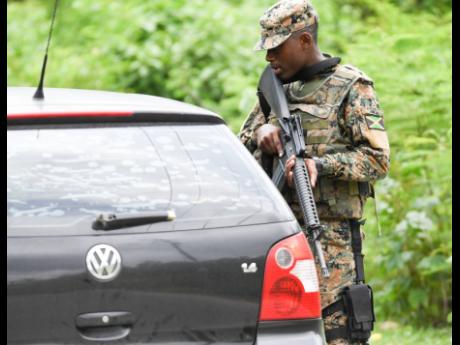SOE red flag - Public defender raises concern over detentions, collection of biometric data
An analysis of figures emerging out of St James is indicating that fewer persons are being detained under the state of public emergency (SOE) declared on April 30.
But this has not allayed concerns by Public Defender Arlene Harrison-Henry, who is questioning the method being used by the security forces to detain persons and how their personal data are being handled.
According to a Jamaica Constabulary Force (JCF) Daily Detention Report, 864 persons were detained in St James up to August 15. This compared to 513 detained in the parish in January alone last year under the previous SOE.
The same report indicates that of the 864 people who were detained in the parish, 347 were brought in for having breached Section 30 of the Emergency Powers Regulations, 2019.
It states: “An authorised person may arrest, without a warrant, and detain, pending enquiries, any person whose behaviour is of such a nature as to give reasonable grounds for suspecting that he has acted or is acting in a manner that is prejudicial to the public safety or has committed, is committing, or is about to commit an offence against these regulations.”
Harrison-Henry has taken issue with the overuse of the section to detain citizens.
“What triggers Regulation (Section) 30 is what causes the difficulty, in that it is a behaviour that must be observed. So you see a young man, you must encounter him behaving in a certain manner so as to cause the police officer to believe that he is involved in activity that is detrimental to public safety or public order,” she told The Gleaner.
She added, “It is targeted, it seems to us. It is targeted at specific communities. That’s how it looks to us and that is what the data actually reveal.”
Two hundred and forty-nine of the persons detained in St James were brought in on reasonable suspicion of murder, according to the JCF Daily Detention Report ended August 15. In the same report seen by The Gleaner, one policeman was noted to have been in charge of the investigation of at least 38 persons detained on these suspicions. They were apprehended and released on the same day.
“So was it reasonable to have taken them into custody in the first place? That is the question Jamaica must ask,” the public defender said.
Under the SOE, the photographs and fingerprints of suspects can be taken without the use of a court order. Harrison-Henry is contending that these data should be destroyed if the suspect has been released without being charged.
“So what it seems to us is that persons are being brought in to be processed and then released. There is no provision in the Emergency Powers Regulations which provide for the safeguard as to how the information gathered on detainees is to be kept, the appropriate security clearance to gain access, and in what circumstances the information should be called into use,” she said.
“It is our position that if you have taken in these people and you have so-called ‘processed’ them and there is nothing on them, this data ought to be destroyed because we don’t need to criminalise young people,” Harrison-Henry added.
SOEs are in effect in the parishes of St James, Hanover, Westmoreland, Clarendon and St Catherine, as well as in the St Andrew South Police Division.

